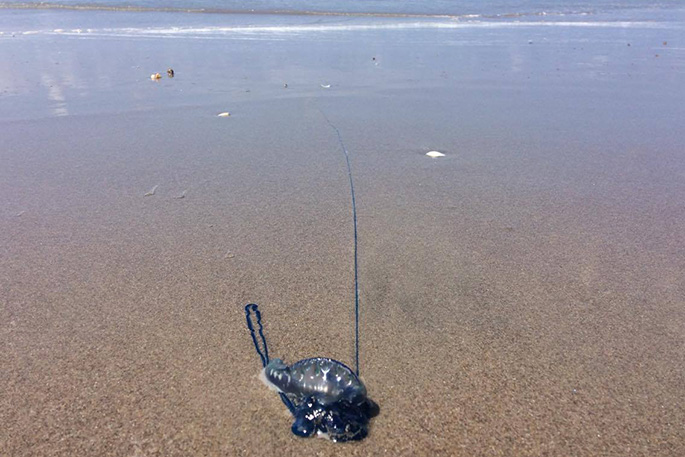Hundreds of poisonous jellyfish-like creatures have been spotted on the sands of Bay of Plenty beaches after the region was hit by extreme weather.
Beach goers reported seeing blue ‘jellyfish' washed up all along the coastline, including on Mount Maunganui, Pāpāmoa and Pukehina beaches – as far east as Whakatāne.
Robyn Whale was on a 2km walk along Pāpāmoa Beach on November 19, when her schnoodle dog Wilson was badly stung.
'It clearly hurt him as he was whimpering a lot, and I could feel his foot pulsating. I had to carry him off the beach to the road and rush him to the emergency out of hours vet. He treated it with painkillers and an injection to bring the swelling down. Wilson was quiet and a bit sorry for himself.”
Pāpāmoa Beach Road vet Brett Kirkland, who treated Wilson, says he sees more stings when bluebottles 'are swarming or blowing on the beach like at present”.
'Generally dogs are in pain for 1-2 hours but can have inflamed welts for a few days. One of my patients had a very severely inflamed face for a few days which I biopsied. The pathologist asked if we had any bluebottles on the beach. The next day the beach was covered in them.”
Brett advises to keep dogs well away from tentacles, even if they appear dead.
Jade Manyweathers warns other locals after she had spotted so many on Arataki Beach, near Mt Maunganui, on November 18 and the following day.
'People were saying they had also seen them all along the coastline. It must be the stormy seas.”
Chris Battershill, professor of Coastal Science at the University of Waikato, says the creatures that people have being seeing recently are known as Man O War or bluebottle jellyfish, but they are not in fact jellyfish at all – the scientific name for them was Physalia.
 Professor Chris Battershill.
Professor Chris Battershill.
'People do refer to them as jellyfish because of their appearance.”
Their sting causes whip-like red welts that can last for up to three days. They can be extremely painful.
Chris says beaching in such heavy numbers is unusual but it's in fitting with recent 'unusual weather patterns”.
'With the prevailing winds, they are often blown on to the beaches because of their bloated air filled sacs.”
The Bay of Plenty is currently experiencing a record marine heatwave which affects marine life, increases rain and tropical cyclones and even lure sharks.
Mount Maunganui Lifeguard Service chair Jamie Troughton says they've had reports of more bluebottles on the beaches.
'Given the sea temperature is warmer than usual at this time of year, it's no surprise to see them wash up. We didn't treat anyone for stings over the weekend but typically deal with 1-2 per weekend over the height of summer.”
While many people suggest the best cure for the pain was to urinate on the sting, Jamie says this is not best practice.
'We've all heard the alternative treatments, but luckily urine has never been - and hopefully never will be - part of the lifeguard first aid kit... Bluebottle stings aren't usually serious, unless the patient has an allergy, and are usually more nuisances than threats.
'What we recommend is getting rid of the tentacles as soon as possible, using gloves or cold water, then soak the sting site in as warm a water as you can handle. Not only is that the current medical advice, but it's probably a little more socially acceptable too."
 Ellie Renwick, left, and Ava McFadden interview surf lifeguard Jamie Troughton alongside Otis Keeble and Otis Duffy. Photo: supplied.
Ellie Renwick, left, and Ava McFadden interview surf lifeguard Jamie Troughton alongside Otis Keeble and Otis Duffy. Photo: supplied.
Ministry of Health advice says methylated spirits or vinegar are not recommended in New Zealand for a jellyfish sting, as vinegar might only be effective deadly box jellyfish found in Australia.
A sting from that box jellyfish, the world's most poisonous creature, can kill in just minutes, and it carries enough venom to kill 60 people.
While anaphylaxis to New Zealand jellyfish is rare, anyone developing symptoms after a sting such as chest or throat tightness, rapid pulse, shortness of breath or swelling around the lips and eyes should seek immediate medical attention.
Signs of poisoning include abdominal pain, nausea and vomiting.
Stings can also develop an infection, which could need treatment, says Ministry of Health advice.
Chris says the idea of using urine to treat a sting probably originated at a time when there were no alternatives or if someone was in an isolated area.
He says while the New Zealand ‘Physalia' species contains a toxin and stings can be extremely painful, they are rarely fatal.
'It depends on the person how badly they are affected as some may have allergic reactions. People should be careful as the stings cause welts as well as pain. It is best not to go near them and definitely not pick them up as they have long tentacles – sometimes up to a metre long – which can quickly wrap around you, and it's likely you will be stung.”



0 comments
Leave a Comment
You must be logged in to make a comment.